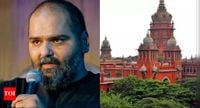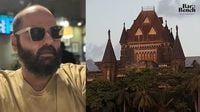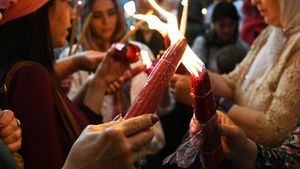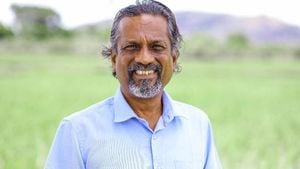Mumbai: The Bombay High Court has granted interim protection from arrest to comedian Kunal Kamra as it deliberates on his petition seeking the quashing of a first information report (FIR) filed against him after a stand-up show in which he referenced Maharashtra Deputy Chief Minister Eknath Shinde. This latest ruling comes as a relief for Kamra, whose previous interim protection from the Madras High Court was only valid until April 17, 2025.
A division bench consisting of Justices Sarang Kotwal and Shriram Modak reserved its decision after hearing arguments from both sides. According to reports from Bar and Bench, the public prosecutor acknowledged that the summons issued to Kamra were under Section 35(3) of the Bharatiya Nagarik Suraksha Sanhita (BNSS), which allows for summons when arrest is not deemed necessary. The court subsequently directed that Kamra should not be arrested pending its final order.
The FIR was lodged in March 2025 following a performance in Mumbai where Kamra allegedly referred to Shinde's split from the Shiv Sena in 2022. The complaint was filed by Shiv Sena MLA Muraji Patel, leading to charges under Sections 353(1)(b), 353(2) (public mischief), and 356(2) (defamation) of the Bharatiya Nyaya Sanhita (BNS). Following the show, Shiv Sena (Shinde) workers vandalized the venue, issuing open threats to Kamra, with Shinde himself later claiming that the violence was in “retaliation.”
Senior Advocate Navroz Seervai, representing Kamra, argued that the comedian's satirical comments fall under the protection of freedom of speech guaranteed by Article 19(1)(a) of the Constitution. He contended that the FIR was an attempt to misuse legal machinery to stifle artistic expression and create a chilling effect. Seervai pointed out procedural lapses, including the haste in registering the FIR without a preliminary inquiry, which is required under Section 173(3) of the BNSS. He also highlighted that the defamation complaint was not filed by Shinde, the allegedly aggrieved party.
In a previous hearing, the court issued notices to the Mumbai Police and Shiv Sena MLA Murji Patel in response to Kamra's petition challenging the FIR. The court observed that Kamra has been facing threats to his safety, including death threats, yet the Mumbai Police insisted on his physical presence for questioning.
During the proceedings, the state counsel argued that Kamra’s act constituted “malicious targeting” rather than humorous criticism, claiming it was intended to lower Shinde’s dignity in society, thus potentially violating Article 21 rights. The prosecutor maintained that Kamra's comments could disturb public tranquility, especially in light of the vandalism that occurred after the show.
This incident has sparked a broader discussion about freedom of expression in India, particularly in the context of political satire. Seervai emphasized that Kamra’s comments were merely political satire, similar to remarks made by various prominent figures in public life, including Shinde himself. He argued that no action was taken against those politicians, highlighting a double standard in how the law is applied.
Kamra’s legal troubles began when he made a joke during his stand-up routine, using a modified version of a popular Hindi song to refer to Shinde as a “gaddar” (traitor). This sparked outrage among Shiv Sena workers, who felt that the comments were disrespectful and defamatory. The incident escalated when a group of party workers vandalized the Habitat studio in Mumbai, where Kamra performed, leading to the arrest of twelve individuals involved in the incident.
Kamra's situation is further complicated by the fact that he has been living in Tamil Nadu for the past five years. The Bombay High Court has suggested that Khar police officials could travel to Tamil Nadu to record Kamra's statement, addressing his concerns for safety while complying with legal procedures.
Seervai criticized the Mumbai Police for their insistence on questioning Kamra in person despite the documented threats against him. He referenced the Supreme Court's recent judgment in the Imran Pratapgarhi case, which criticized the Gujarat Police for their handling of a similar situation involving a poet. Seervai argued that literature, including satire, is essential for a meaningful life and should not be stifled by legal threats.
The court's decision to reserve its ruling on Kamra's plea reflects the ongoing tension between artistic expression and political sensitivity in India. As the legal proceedings continue, many are watching closely to see how the courts will balance these competing interests.
In conclusion, Kunal Kamra's case highlights the precarious position of comedians and artists in India, where freedom of speech is often challenged by political powers. As the Bombay High Court deliberates on the matter, the outcome could have significant implications for the future of satire and artistic expression in the country.








